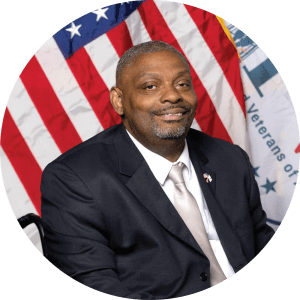PVA president set to testify before congress
By Robert L. Thomas Jr.
 We are approaching the end of the third quarter of fiscal year 2024.
We are approaching the end of the third quarter of fiscal year 2024.
Historically, March is the time Paralyzed Veterans of America’s (PVA) Government Relations Department hosts our annual Advocacy/Legislation Seminar. It’s a four-day event where all 33 chapters send representatives to Washington, D.C. They spend two days learning about PVA’s top priorities in preparation for two days of trips to Capitol Hill for visits with their respective congressional representatives.
This year, we’re going to be doing things a bit differently, as we’ve decided to move the seminar to June. The decision was made to attract more individuals to participate in the seminar during better weather conditions, increase opportunities for chapter government relations directors to get more face-to-face time with their representatives and to keep PVA’s priorities at the forefront throughout the year.
Although the seminar has moved, PVA’s national president will still have the opportunity to testify before this month’s joint session of the House and Senate Veterans’ Affairs Committees. The testimony provides a top-level overview of important issues that affect veterans with spinal-cord injury and disease (SCI/D).
On March 6, I’ll be testifying for the first time on behalf of PVA. I’m honored to sit in that seat to testify in front of our congressional leaders and allow them to hear what our members need.
We have more than a few topics that are of importance to our members that I’ll deliver as part of my oral and written testimonies, but I wanted to share one with you: protecting access to the Department of Veterans Affairs (VA) specialized care.
This is very important because without access to specialized care services, our members wouldn’t be able to maintain their quality of life and health care. In maintaining this service, we need to ensure that the VA places an emphasis on hiring and retaining adequate staff and not just putting a body in a place. These individuals need to be trained in the specialty areas needed by our population.
Keep in mind, traveling to Washington, D.C., and going on the Hill aren’t the only ways you can advocate for veterans with SCI/D and people with disabilities. You can be a voice right from home when your representative is back in his or her district.
This can be achieved by attending roundtable discussions, writing letters and joining PVAction force (pva.org/research-resources/pva-action-force).
If you’re a PVA member or an individual with a soft spot in your heart for veterans, please contact your local PVA chapter and inquire how you can get involved with our advocacy efforts.


